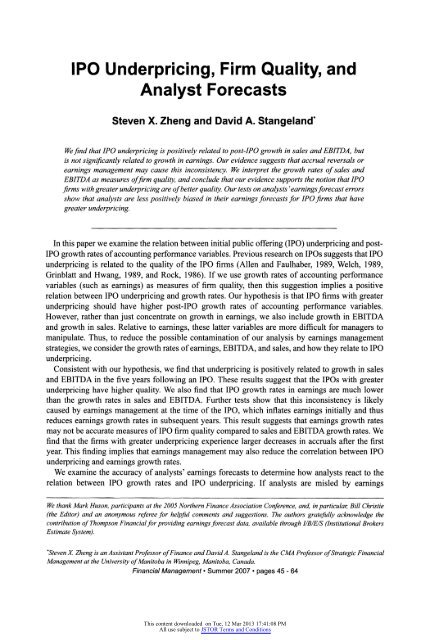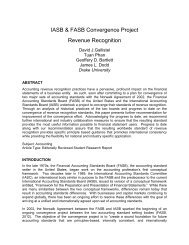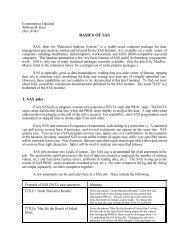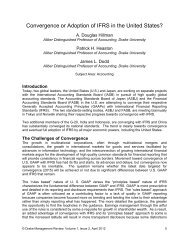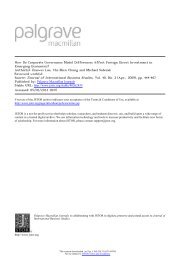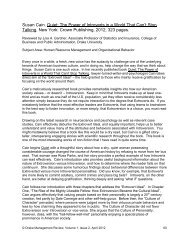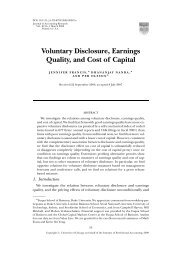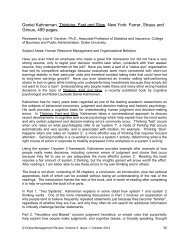IPO Underpricing, Firm Quality, and Analyst Forecasts
IPO Underpricing, Firm Quality, and Analyst Forecasts
IPO Underpricing, Firm Quality, and Analyst Forecasts
You also want an ePaper? Increase the reach of your titles
YUMPU automatically turns print PDFs into web optimized ePapers that Google loves.
<strong>IPO</strong><strong>Underpricing</strong>, <strong>Firm</strong> <strong>Quality</strong>, <strong>and</strong><strong>Analyst</strong> <strong>Forecasts</strong>Steven X. Zheng <strong>and</strong> David A. Stangel<strong>and</strong>*We find that <strong>IPO</strong> underpricing is positively related to post-<strong>IPO</strong> growth in sales <strong>and</strong> EBITDA, butis not significantly related to growth in earnings. Our evidence suggests that accrual reversals orearnings management may cause this inconsistency. We interpret the growth rates of sales <strong>and</strong>EBITDA as measures offirm quality, <strong>and</strong> conclude that our evidence supports the notion that <strong>IPO</strong>firms with greater underpricing are of better quality. Our tests on analysts 'earnings forecast errorsshow that analysts are less positively biased in their earnings forecasts for <strong>IPO</strong> firms that havegreater underpricing.In this paper we examine the relation between initial public offering (<strong>IPO</strong>) underpricing <strong>and</strong> post-<strong>IPO</strong> growth rates of accounting performance variables. Previous research on <strong>IPO</strong>s suggests that <strong>IPO</strong>underpricing is related to the quality of the <strong>IPO</strong> firms (Allen <strong>and</strong> Faulhaber, 1989, Welch, 1989,Grinblatt <strong>and</strong> Hwang, 1989, <strong>and</strong> Rock, 1986). If we use growth rates of accounting performancevariables (such as earnings) as measures of firm quality, then this suggestion implies a positiverelation between <strong>IPO</strong> underpricing <strong>and</strong> growth rates. Our hypothesis is that <strong>IPO</strong> firms with greaterunderpricing should have higher post-<strong>IPO</strong> growth rates of accounting performance variables.However, rather than just concentrate on growth in earnings, we also include growth in EBITDA<strong>and</strong> growth in sales. Relative to earnings, these latter variables are more difficult for managers tomanipulate. Thus, to reduce the possible contamination of our analysis by earnings managementstrategies, we consider the growth rates of earnings, EBITDA, <strong>and</strong> sales, <strong>and</strong> how they relate to <strong>IPO</strong>underpricing.Consistent with our hypothesis, we find that underpricing is positively related to growth in sales<strong>and</strong> EBITDA in the five years following an <strong>IPO</strong>. These results suggest that the <strong>IPO</strong>s with greaterunderpricing have higher quality. We also find that <strong>IPO</strong> growth rates in earnings are much lowerthan the growth rates in sales <strong>and</strong> EBITDA. Further tests show that this inconsistency is likelycaused by earnings management at the time of the <strong>IPO</strong>, which inflates earnings initially <strong>and</strong> thusreduces earnings growth rates in subsequent years. This result suggests that earnings growth ratesmay not be accurate measures of <strong>IPO</strong> firm quality compared to sales <strong>and</strong> EBITDA growth rates. Wefind that the firms with greater underpricing experience larger decreases in accruals after the firstyear. This finding implies that earnings management may also reduce the correlation between <strong>IPO</strong>underpricing <strong>and</strong> earnings growth rates.We examine the accuracy of analysts' earnings forecasts to determine how analysts react to therelation between <strong>IPO</strong> growth rates <strong>and</strong> <strong>IPO</strong> underpricing. If analysts are misled by earningsWe thank Mark Huson, participants at the 2005 Northern Finance Association Conference, <strong>and</strong>, in particular Bill Christie(the Editor) <strong>and</strong> an anonymous referee for helpful comments <strong>and</strong> suggestions. The authors gratefully acknowledge thecontribution of Thompson Financial for providing earnings forecast data, available through I/B/E/S (Institutional BrokersEstimate System).*Steven X Zheng is an Assistant Professor of Finance <strong>and</strong> David A. Stangel<strong>and</strong> is the CMA Professor of Strategic FinancialManagement at the University of Manitoba in Winnipeg, Manitoba, Canada.Financial Management * Summer 2007 * pages 45 - 64This content downloaded on Tue, 12 Mar 2013 17:41:08 PMAll use subject to JSTOR Terms <strong>and</strong> Conditions


